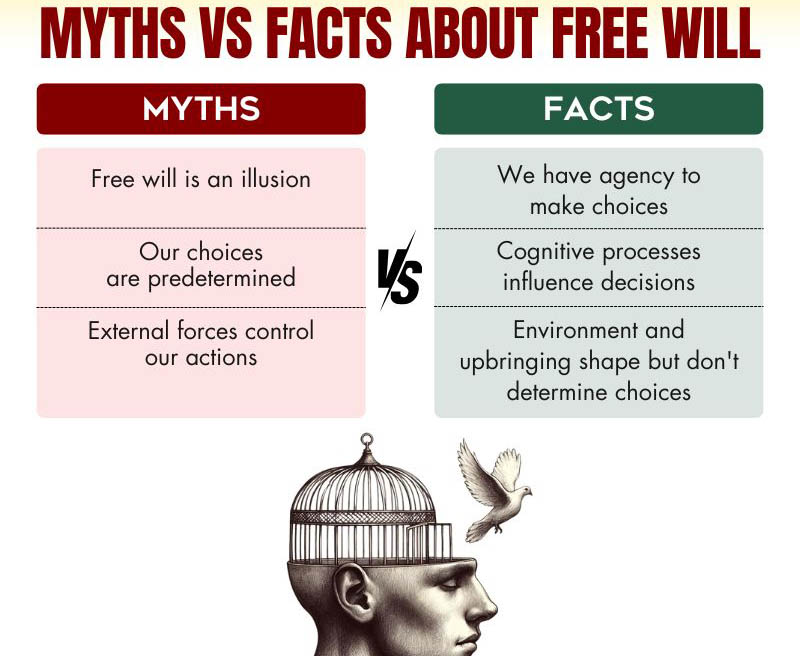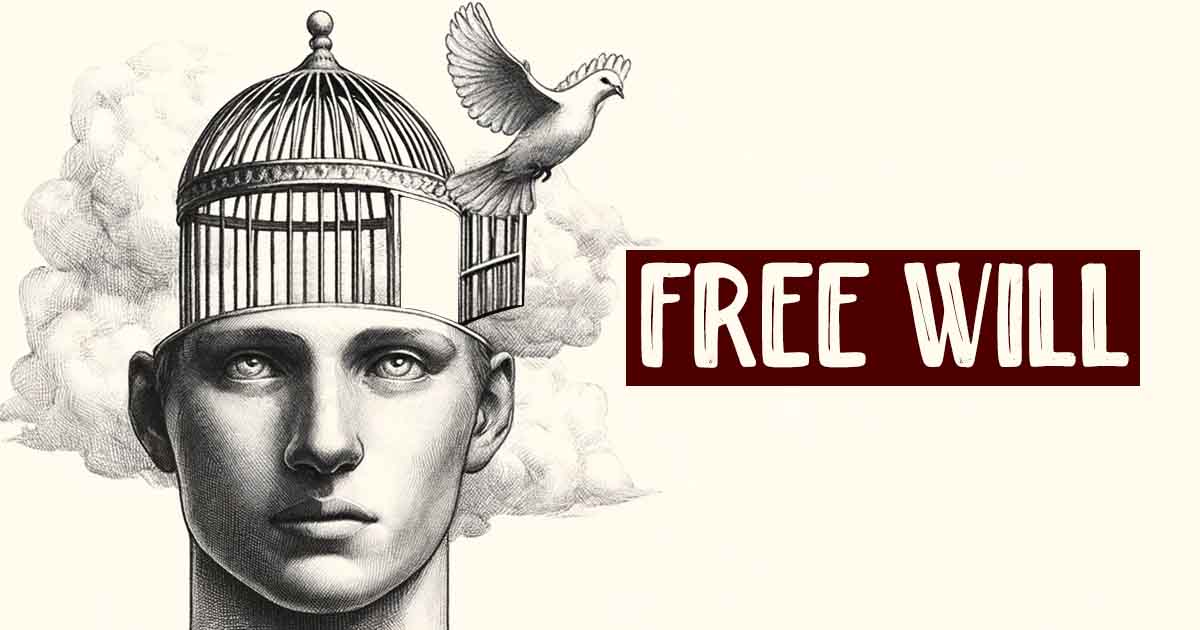Free will is the philosophical notion that individuals possess the capacity to make choices, without being influenced by external factors. It closely intersects with mental health, shaping an individual’s perceptions of agency and self-determination.
What Is Free Will?
Free will refers to the capacity of individuals to make choices and decisions 1 Lavazza A. (2016). Free Will and Neuroscience: From Explaining Freedom Away to New Ways of Operationalizing and Measuring It. Frontiers in human neuroscience, 10, 262. https://doi.org/10.3389/fnhum.2016.00262 of their own volition, independent of external influences or determinism. It embodies the idea that individuals have the ability to act according to their own desires, beliefs, and values, rather than being solely determined by factors such as genetics, environment, or fate.
People who generally possess the power of free will are typically considered to be those who have the cognitive capacity to reason and make choices. This includes most mentally healthy adults who have the ability to reflect on their options, weigh consequences, and make decisions based on their personal values and preferences. However, the extent to which individuals can exercise free will may vary depending on factors such as psychological health, cognitive abilities, cultural background, and socioeconomic circumstances.
Characteristics Of Free Will
The common 2 Hallett M. (2016). Physiology of free will. Annals of neurology, 80(1), 5–12. https://doi.org/10.1002/ana.24657 characteristics of free will include:
- Capacity for autonomous decision-making.
- Ability to act according to personal desires and values.
- Independence from external influences or determinism.
- Moral responsibility for actions and choices.
- Conscious of one’s choices and their consequences.
- Personal autonomy to craft one’s identity and make choices.

Why Do Some People Believe In Free Will?
Some people believe in free will because it aligns with their personal experiences 3 Li, C., Wang, S., Zhao, Y., Kong, F., & Li, J. (2017). The Freedom to Pursue Happiness: Belief in Free Will Predicts Life Satisfaction and Positive Affect among Chinese Adolescents. Frontiers in psychology, 7, 2027. https://doi.org/10.3389/fpsyg.2016.02027 and observations of human behavior. They perceive themselves and others as making conscious choices and decisions, which they attribute to the exercise of free will.
Moreover, this belief can also impact mental health by influencing perceptions of control and personal agency, potentially shaping individuals’ coping mechanisms and resilience in the face of adversity. Additionally, the idea of free will may offer a sense of meaning and purpose, as it implies that individuals have the ability to make meaningful choices that contribute to their personal growth and fulfillment.
Moreover, the belief in free will can contribute to a mindset that focuses on the potential for positive change. When people see their actions as choices rather than predetermined outcomes, they are more likely to engage in behaviors that lead to beneficial intuitive outcomes. This can create a cycle where the belief in free will leads to actions that reinforce positive outcomes, further solidifying the belief in one’s ability to control their destiny.
Factors Influencing The Practice Of Free Will
Several factors 4 Dotsenko, E. L., & Pchelina, O. V. (2021). Free Will as a Paradox: Empirical Evaluation of the Construct of Everyday Consciousness. Psychology in Russia : state of the art, 14(2), 137–151. https://doi.org/10.11621/pir2021.0109 influence the practice of free will, including:
- Mental well-being and cognitive abilities affect decision-making.
- Social norms shape individuals’ understanding of freedom.
- External factors like family and community influence freedom.
- Economic resources affect the range of choices available.
- Personal values guide decisions and actions.
- Emotion regulation impacts decision-making and autonomy.
Read More About Decision-making Here
Free Will And Mental Illness
Free will and mental illness intersect in complex ways 5 Tancredi L. R. (2007). The neuroscience of “free will”. Behavioral sciences & the law, 25(2), 295–308. https://doi.org/10.1002/bsl.749 , as certain psychiatric disorders can impact individuals’ ability to exercise autonomy and make decisions. Disorders such as schizophrenia, characterized by distorted thinking and perception, can diminish individuals’ capacity to discern reality and make rational choices, thus limiting their expression of free will. Similarly, severe depression can impair motivation and cognitive functioning, making it challenging for individuals to engage in purposeful decision-making and assert their autonomy.
Additionally, conditions like substance abuse disorders can further complicate the exercise of free will by impairing judgment and self-control, leading individuals to act impulsively or engage in risky behaviors. Furthermore, the stigma surrounding mental illness can exacerbate feelings of powerlessness and undermine individuals’ sense of agency, hindering their ability to assert their free will and seek assistance.
Read More About Self-control Here

How To Healthily Practice Free Will
Consider the following tips 6 Rappaport Z. H. (2011). The neuroscientific foundations of free will. Advances and technical standards in neurosurgery, (37), 3–23. https://doi.org/10.1007/978-3-7091-0673-0_1 for a healthy practicing of free will:
- Self-awareness: Understand your values, desires, and motivations.
- Critical thinking: Analyze options and consequences before making decisions.
- Balance: Consider short-term and long-term implications of choices.
- Responsibility: Acknowledge accountability for your actions and their impact.
- Respect: Consider the rights and freedoms of others in decision-making.
- Flexibility: Adapt to new information or changing circumstances.
- Self-care: Prioritize mental, emotional, and physical well-being.
- Boundaries: Set limits to maintain autonomy and respect personal integrity.
- Learning: Continuously educate yourself to make informed choices.
- Reflection: Regularly assess decisions and their alignment with personal values.
- Empathy: Consider how choices may affect others and practice compassion.
Read More About Empathy Here
Takeaway
The concept of free will is intricately linked to mental health, as it intersects with individuals’ capacity to make autonomous decisions and assert their agency. Mental illness can complicate this relationship by impairing cognitive functioning and diminishing individuals’ sense of autonomy. Addressing the intersection of free will and mental health requires efforts to promote access to mental health care, reduce stigma surrounding psychiatric disorders, and empower individuals to exercise their autonomy in pursuing their well-being.
At A Glance
- Free will refers to the capacity of individuals to make choices and decisions of their own volition.
- The concept of free will is deeply rooted in philosophical, religious, and cultural traditions.
- Some people believe in free will because it aligns with their personal experiences and observations of human behavior.
- Free will and mental illness are inversely related.
- Addressing the intersection of free will and mental illness requires a nuanced understanding of how symptoms and societal attitudes impact individuals’ free will.
Frequently Asked Questions (FAQs)
1. What are the limitations of free will?
Free will has limitations due to external influences, genetics, and subconscious biases.
2. Is human free will an illusion?
Human free will’s existence is debated, with factors like determinism and unconscious influences casting doubt on its reality.
3. What is the benefit of free will?
Free will allows individuals to make autonomous decisions, shape their destinies, and take responsibility for their actions.
4. Does everyone have free will?
The question of whether everyone has free will is a matter of philosophical debate, with perspectives varying from deterministic views suggesting our actions are predetermined by factors beyond our control to those asserting that individuals possess some degree of agency in decision-making.











